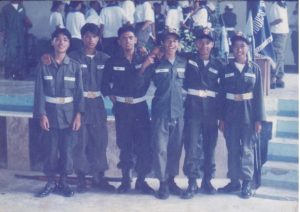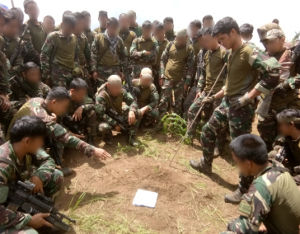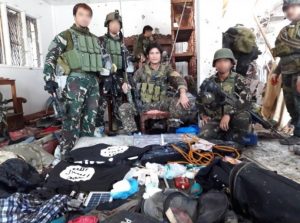As an officer in the Special Operations Command of the Armed Forces of the Philippines, Captain Sharco Mabini’s days may seem dulled down by routine, but to a non-soldier’s eyes, his days are nothing short of inspiring. In his 14 years of service, his daily grind is marked by desire, devotion, and discipline. Becoming a soldier is a childhood dream come true for this 35-year-old man who hails from Tagum City, Davao del Norte. He can still remember seeing soldiers as a young boy and how much admiration he had for them that he knew he just had to become one of them. After he graduated from high school, he immediately asked permission from his mother if he could join the army. His mother didn’t agree with his plan and urged him instead to finish a degree first. His desire was still to become a soldier, but he adhered to his mother’s suggestion. He finished a degree in Criminology in 2004 and then went on to pursue his childhood dream of becoming a soldier.

Sharco Mabini, second from left
As he devoted himself to training and learning to become a soldier, he acquired a new-found devotion for the Philippines as well. He realized that our country’s sovereignty, freedom, and peace had to be defended and safeguarded. Days, weeks, and months spent on the field; rigorous physical trainings under the scorching heat of the sun; and the strict demand of tactical unit assignments were his discipline. All these led him and his team of 80-100 soldiers to the neutralization of the Maute terrorists in Marawi.
The date was the 16th of October 2017—an ordinary day for some Filipinos who were oblivious to the grueling conditions of the Battle of Marawi. To the Maranaos, it was the day of freedom. It was freedom for the bakwits, the displaced Maranao refugees so they could come back home to Marawi. It was freedom for the Maranaon families to search for missing loved ones. It was the day that some families got to grieve and mourn for their dead, and the day that some families got to embrace those who were alive after 5 months. It was the day that the Maranaos were free to rebuild their lives from the ashes left of the capital city of Lanao del Sur.
Life in Marawi was normal before the siege. The city bustled with workers who were making a living through agriculture, exporting, and trading. It was the start of the Ramadhan. What was supposedly a peaceful time spent with loved ones became a time of terror that separated husband and wives and children. It was on the 23rd of May 2017 when the Marawi siege started. Captain Sharco Mabini, along with his unit of soldiers, were deployed and assigned to the infantry brigade whose area of operations included the city of Marawi. The siege was triggered when Captain Sharco Mabini and some of his men conducted a raid on one of the safe houses of a notorious Maute terrorist leader. After the said raid, Maute terrorists all over Marawi City retaliated and stormed Camp Ranao and occupied several buildings at the heart of Lanao del Sur— including the city hall of Marawi City. When the Maute terrorists managed to take hold of some of the buildings in Marawi, that’s when it dawned on the Maranaos and the soldiers that the battle they were about to face was a big one. On the same day, some of the Maranaos started to flee the city, while others hesitated to leave their hometown. The citizens who stayed put in Marawi faced the cruel attacks of the Maute group. The civilians witnessed their homes crumbling down from explosions and some of their loved ones captured and held hostage.
During the Marawi siege, Captain Sharco Mabini was one of the company commanders of Light Reaction Regiment, a counter-terrorism unit of the AFP. As an officer in the said unit, he was responsible to lead his co-soldiers in accomplishing the mission of their unit. This was Captain Sharco Mabini’s first year of duty as a Company Commander.

Fear was one of the things that surfaced in his and his men’s hearts. As soldiers, they knew and understood the danger they were facing. Along with fear was the nagging feeling of doubt—when would this war end? But amongst the range of emotions that he felt, he, too, felt deeply honored to be a part of the army’s mission to protect and defend the city.
His being an officer and a soldier entailed that his emotions would have to be dealt with at a much later time. Customary to SOCOM practice, he focused on accomplishing the mission at hand—to defend the city of Marawi and its citizens. As part of accomplishing this mission, Captain Sharco Mabini intentionally and wholeheartedly forwent his privilege of having personal time and instead set his mind to become meticulous and thorough in their area of work. It was not only the city that was at stake—the livelihood and infrastructure—but more so, lives were at stake. The fate of the Maranaos rested on the very hands of the soldiers.

This SOCOM practice was put to the test when co-soldiers of Captain Sharco Mabini acquired battle injuries and worse, became casualties of war. He lost 5 devoted and professional troops in the span of the urban war, together with more or less 40 men who incurred minor injuries and serious injuries starting from small wounds to amputated limbs. Most of the injuries that his men incurred were due to gunshots and IEDs (improvised explosive device). Despite this, Captain Sharco Mabini remained composed and focused by constantly briefing and debriefing with his unit. They assessed every soldier in their unit and evaluated their strategies and techniques to figure out their shortcomings and weak points as a unit, and to find out how they could improve and strengthen their unit. Sometimes, Captain Sharco Mabini wept for his co-soldiers on his own because as the company commander, his soldiers looked to him not only for tactical strategies and techniques, but also for his leadership and influence. Thus, he could not afford to show emotional frailty at such a crucial time.

The Marawi siege ended five months after it started. The date was the 16th of October 2017. The Armed Forces of the Philippines were able to neutralize the Maute group of terrorists and in doing so, won the longest urban battle in the history of the Philippines. Captain Sharco Mabini and his men subsequently returned to their headquarters in Fort Magsaysay, Palayan City, for re-training, but not without a 30-day break to reconnect with themselves and with their families.
Captain Sharco Mabini is one of the unnamed heroes of the Philippines. There are many more like him who helped realize this herculean task of victory. His name harkens back to another noble hero of the Philippines, Apolinario Mabini. Major Sharco Mabini fought for the Philippines in a different way that Apolinario Mabini did—but the difference in how they fought doesn’t diminish the greatness of what they did for our beloved nation. Indeed, he is a modern-day Mabini—a modern-day hero.
As of this writing, Captain Sharco Mabini still serves in the Philippine Army, furnished with weapons of knowledge and skill from his humbling experiences. Today he is decorated not only with medals of honor, but also with a major upgrade to his name—he entered Marawi a faithful soldier and he came out of it a hero—he is (now) Major Sharco Mabini.


Amber Lynne Salud
Amber Lynne Salud serves as one of the senior leaders in Cavite House of Prayer. Her life vision is to see women discover their identity in Christ and to help raise them up as a great host of women who will proclaim Jesus is Lord. She wants to see women take up their role in the Kingdom of God. She is a wedding planner and a writer. On most days, she's watching her husband, Roy, goof around with their son, David.





